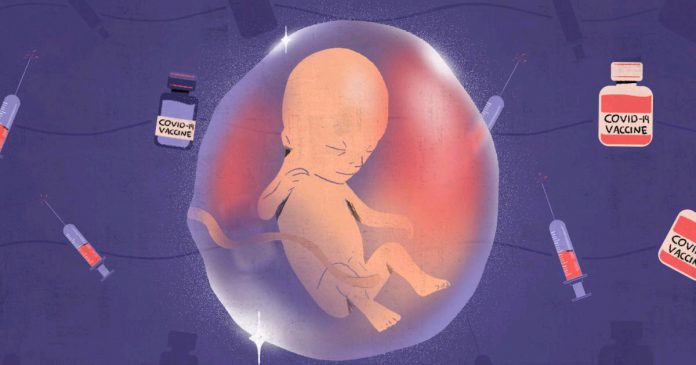With the Coronavirus pandemic continuing to cause more than 127 million infections and more than 2.5 million deaths worldwide, medical researchers are watching carefully the infection and death rates, especially among those who have received vaccines
This helps in reaching a preliminary estimate of the effectiveness of the Covid-19 vaccine in terms of decelerating the widespread of the pandemic in the upcoming waves.
Pregnant women are one of the high-risk groups that require special protection from Coronavirus infection, but the urgent question is whether or not vaccination from Covid-19 will produce protective antibodies able to go through the umbilical cord to the fetus.
A new preliminary study on medRxiv, describes the first case of Coronavirus antibodies detected in the umbilical cord blood of a baby born to a mother who was immunized with the first dose of Coronavirus mRNA vaccine from Moderna three weeks ago.
The current study aims to contribute to the total evidence of protective neonatal immunity resulting from the mother being vaccinated with current vaccines against the Coronavirus, this study was on a frontline healthcare worker who received the first dose of Moderna, the mRNA vaccine, when she was pregnant for 36 weeks.
After three weeks, she gave birth to a healthy baby by natural birth, the infant was active and normal in all appearances, and according to the standard infant assessment, the mother began exclusive breastfeeding and received the second dose of vaccine in time, during the postpartum period.
Immediately after birth, cord blood samples were taken under sterile conditions, along with classification of newborn blood and direct anti-globulin test, and a sample was used to examine antibodies to the high protein of the Coronavirus.
Umbilical Cord blood contained immunoglobulin G (IgG) antibodies to the Coronavirus, with the amount of 1.3 units / ml. These antibodies targeted the Receptor-Binding Domain (RBD) of the viral spike antigen.
The researchers reported that this is the first time that antibodies from umbilical cord blood derived from the mother have been detected for Coronavirus, after the mother was immunized with the Coronavirus vaccine.
After reviewing the results of the mentioned research, we can conclude that the new Coronavirus vaccines will lead to efficient protection for newborns against Coronavirus from their immunized mothers.
However, this must be proven through experimental evaluation, since natural infection with this virus does not appear to be related to the level of expected passage of protective antibodies through the placenta.
Coronavirus Vaccination during pregnancy compared to other diseases
Earlier, the administration of influenza, diphtheria and whooping cough vaccines to pregnant women was associated with the presence of antibodies in the fetus, which protect the latter from these diseases, with a great extent of safety and efficacy.
This has led to recommendations that pregnant women receive measles and diphtheria vaccines during pregnancy, in order to protect their newborns from these diseases, and a similar effect was expected after the mother was vaccinated against Coronavirus, but data is not available to support such a recommendation.
How long Coronavirus Immunity Lasts for Newborns?
The immunity that newborns get from their mothers is temporary.
It begins to fade after a few weeks or months (exact durations vary with the type of antibody).
The authors of the previous study indicate that more studies and documentation are needed to determine the amount of Coronavirus antibodies that are expected to be transmitted to the fetus during pregnancy.
The researchers also recommend studying how long these antibodies last in newborns so that we can determine the appropriate age of the child to receive the vaccine later.
Coronavirus Vaccination Trials for Pregnant
In fact; Due to the risk, pregnant women were excluded from the primary vaccine trials, so there wasn’t much awareness about this, but that is changing right now.
Pfizer Biontech recently began a new phase of vaccine trials (phase 2/3) for 4,000 healthy pregnant women.
As these trials begin, and more children are born carrying antibodies to vaccinated individuals, the expected results will help the medical community find the best way to protect these infants.

